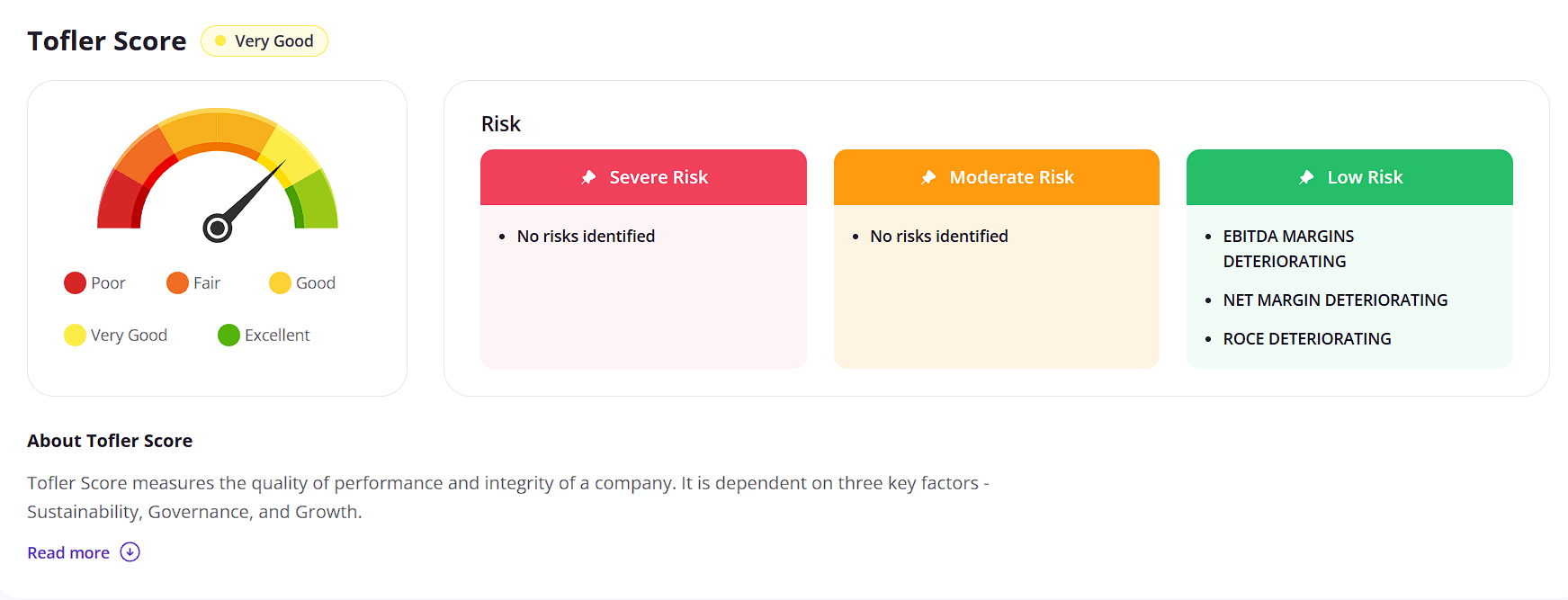
Are you really sure about who you’re doing business with?
Every business relationship is built on trust — but smart businesses verify before they commit. Whether you’re vetting a potential supplier, evaluating a customer’s payment reliability, or considering a partnership, knowing the true health and integrity of a company can save you from costly mistakes.
The good news? There’s a single metric designed to give you this insight at a glance: The Tofler Score.
What Exactly Is the Tofler Score?
Think of the Tofler Score as a comprehensive health check for businesses. It measures both the performance quality and integrity of a company on a scale of 0-100, giving you an immediate sense of whether a business is worth your time, money, and trust.
A company with a high Tofler Score is likely to:
- Grow strong and sustainably
- Pay creditors and suppliers on time
- Complete compliance requirements properly
- Operate with integrity among its industry peers
But what makes this score truly valuable is that it’s not just looking at a single dimension of business health — it examines three critical factors that together provide a complete picture.

The Three Pillars of the Tofler Score
1. Sustainability (35% weight)
This measures the overall financial health of the company. It’s not just about having money in the bank — it’s about how effectively a business manages what it has.
What it evaluates:
- Profitability trends
- Return on assets and capital
- Liquidity position
- Solvency indicators
- Working capital efficiency
- Performance volatility across years
- Quality of assets and liabilities
Why it matters: A company with high sustainability scores deploys its assets effectively, maintains tight operational controls, and grows profitably. Most importantly, it can consistently pay suppliers, creditors, and lenders on time — which might include you.
2. Trustworthiness (35% weight)
While numbers don’t lie, they don’t always tell the complete truth. The trustworthiness component looks beyond the financials to assess a company’s integrity.
What it evaluates:
- Compliance with TDS, GST, and other legal requirements
- Potential conflicts of business interest
- Presence on defaulter lists
- Financial statement consistency
- Connections to non-compliant or defaulting companies
- Directorship conflicts
- Registration details and location
Why it matters: A trustworthy company operates professionally, stays compliant, maintains distance from tainted entities, doesn’t manipulate its financials, and generally runs clean operations. In short — they’re less likely to cause you headaches down the road.
3. Growth (30% weight)
The final component assesses how fast the company has been growing and, crucially, whether that growth is sustainable.
What it evaluates:
- Income growth trajectories
- Profitability trends
- Employee expansion
- Asset growth
- Sustainability of current growth rates
Why it matters: The growth component distinguishes between genuine business expansion and manipulated or unsustainable growth spikes. It helps you identify companies that are truly on an upward trajectory rather than those creating a temporary illusion of success.
Making Sense of the Score
Understanding what the number means is straightforward:
| Score Range | Rating |
| Less than 30 | Poor |
| 30 – 45 | Fair |
| 45 – 60 | Good |
| 60 – 80 | Very good |
| 80 – 100 | Exceptional |
When Should You Check a Tofler Score?
The Tofler Score becomes particularly valuable when:
- Evaluating new suppliers: Will they consistently deliver, or disappear with your advance payment?
- Assessing customer creditworthiness: Before offering generous payment terms, check if they’re likely to honor them.
- Considering partnerships: Their business practices and financial health will directly impact yours.
- Competitive analysis: How do your peers measure up? Where do you stand in comparison?
- Investment decisions: Before putting money into a business, understand its true health beyond the pitch deck.
Beyond the Score: Digging Deeper
While the Tofler Score gives you a quick assessment, the detailed breakdown offers even more value:
- Sub-score comparisons: Is the company financially solid but with questionable compliance? Or trustworthy but financially struggling?
- Industry benchmarking: How does this company compare to others in the same sector? What’s normal for your industry?
- Trend analysis: Is their score improving or declining over time? A downward trend might signal emerging problems.
Final Thoughts: Smart Business Is Informed Business
In today’s complex business environment, gut feelings and reputation aren’t enough to base decisions on. The Tofler Score offers a data-backed approach to assessing business relationships before you commit.
It’s not about avoiding every company that isn’t perfect — it’s about understanding the risks you’re taking and managing them appropriately. Maybe you’ll still work with a company with a lower score, but with modified payment terms or additional safeguards.
Don’t rely on assumptions or outdated information. Use objective, comprehensive data to make smarter business decisions.
Remember: Trust is good. Verification is better. The Tofler Score gives you both.
Note: The Tofler Score is not a credit rating and doesn’t have approval from any statutory or regulatory body. It represents Tofler’s unbiased opinion on a company’s performance and state of affairs.






